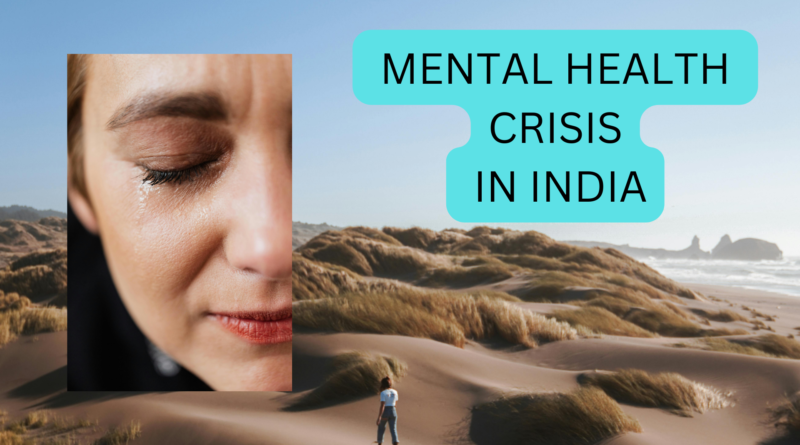One of the Most Dangerous Mental Health Crisis
The Silent Epidemic: India’s Urgent Mental Health Crisis Post-COVID
As a practicing physician in India, I am increasingly seeing young individuals with many health issues – mainly mental health. It may be their lifestyle, the post-pandemic effect, or the expectation of achieving more in their career growth. But all of this is taking a toll on their mental health and making them more anxious. I see them coming to my clinic with mental issues.
The biggest problem in Indian families is the attitude to dismiss the fact that someone may have anxiety or tension. The most common statement from family members is why they think so negatively or “Tension kyu lene ka.” This dismissive attitude, unfortunately, only compounds the problem, pushing those struggling further into silence.
The COVID-19 pandemic has left an indelible mark on our lives, but beyond the physical health challenges, it has also triggered a mental health crisis of unprecedented scale. The isolation, economic uncertainties, and sheer unpredictability of the situation have taken a severe toll on mental well-being, particularly in India. Here, cultural factors such as intense familial responsibilities, societal expectations, and the persistent stigma surrounding mental illness can further exacerbate these challenges. Let’s delve into the urgent mental health issues faced by Indian adults post-COVID and explore practical ways we can collectively address and manage these pressing concerns.
Understanding the Shifting Landscape of Mental Health Issues
Mental health encompasses our emotional, psychological, and social well-being. It influences how we think, feel, and act. Common mental health disorders include anxiety, depression, bipolar disorder, and schizophrenia, each affecting individuals differently.
Mental health disorders manifest in various ways. Common symptoms include persistent sadness, excessive worry, mood swings, withdrawal from social activities, and changes in sleep or appetite. Recognising these signs early and seeking timely intervention is crucial for effective management. Many of my patients come to the clinic with hyperventilation, severe breathlessness, or sudden onset of severe weakness, becoming incredibly anxious with the fear of a significant physical illness, often even fear of death – when the root cause is actually mental stress.
The Unspoken Toll: Impact of COVID-19 on Mental Health in India
According to a survey by the Indian Psychiatry Society, there was a 10-fold increase in mental health cases during the lockdown. This alarming rise underscores the urgent need for robust mental health services and accessible support.
Behind every statistic is a human story. Take Rina, a young professional who lost her job during the pandemic. The ensuing financial strain and isolation led to severe anxiety, manifesting in constant worry and panic attacks. Similarly, consider the plight of a young student, traditionally living in a bustling joint family, suddenly confined to a small room for online classes, leading to profound feelings of loneliness and a lack of motivation. Stories like Rina’s and countless others illustrate the profound and often silent impact of the pandemic on our collective mental health.
The Most Common Mental Health Issues Post-COVID in India
The post-COVID era has seen a surge in specific mental health challenges:
- Anxiety and Panic Disorders: The pervasive uncertainty of the pandemic, coupled with fear of infection, worries about loved ones, and financial instability, has significantly heightened anxiety levels and triggered panic disorders in many.
- Depression and Mood Disorders: Prolonged isolation, the disruption of normalcy, and the collective sense of loss have fueled widespread depression. Feelings of hopelessness, despair, and anhedonia (inability to experience pleasure) are distressingly common as people grapple with ongoing life disruptions.
- Stress and Burnout: The blurring lines between work and home life, especially with work-from-home mandates, have led to unprecedented levels of stress and burnout. The constant pressure to adapt to new norms and the relentless news cycle have left many feeling utterly overwhelmed and emotionally exhausted.
- Social Isolation and Loneliness: Lockdowns and social distancing measures, while necessary, have intensified feelings of loneliness and disconnection. The vital lack of physical interaction has particularly affected those living alone, away from family, or who previously relied heavily on social gatherings.
- Grief and Loss: The pandemic has brought about unprecedented loss, both human and otherwise. The grief of losing loved ones, often compounded by the inability to perform traditional mourning rituals, has led to complex and prolonged emotional distress. Many also grieve the loss of their former lives, routines, and opportunities.
Contributing Factors to Mental Health Issues Post-COVID
Several interconnected factors have contributed to this escalating crisis:
- Economic Uncertainty and Job Loss: The severe economic fallout from the pandemic has resulted in widespread job losses, financial instability, and business closures, creating immense stress and anxiety for countless individuals and families.
- Health Concerns and Fear of Infection: The ongoing fear of COVID-19 infection, coupled with concerns about one’s own health and that of loved ones, continues to be a pervasive source of anxiety and hypervigilance.
- Changes in Lifestyle and Routine: The abrupt and fundamental changes in daily routines, from work to education to social interactions, have disrupted our intrinsic sense of normalcy and predictability, contributing significantly to stress and anxiety.
- Lack of Social Interaction: Humans are inherently social beings. The enforced reduction in social interaction has led to profound feelings of isolation, loneliness, and a diminished sense of community and belonging.
Coping Strategies and Solutions: A Path Towards Healing
Addressing this mental health crisis requires a multi-pronged approach, encompassing individual efforts, professional support, and societal changes.
Seeking Professional Help: An Open Door to Healing
I’d like you all to be open to suggestions when they come from a doctor. Do not think that we are dismissing your problem. When a doctor suggests professional mental health support, it’s not a judgment; it’s a pathway to healing.
- Psychologists, Psychiatrists, and Therapists: Professional help is often crucial for managing complex mental health issues. Psychologists, psychiatrists (who can prescribe medication), and therapists (counselors) can provide the necessary support, diagnosis, and treatment plans tailored to individual needs.
- Online Therapy and Helplines: With incredible technological advancements, online therapy platforms and confidential helplines have become invaluable resources. They provide accessible and often immediate support to those in need. Importantly, these services can be accessed anonymously, effectively removing the social taboo of “going to a mental doctor” from the equation, making help more reachable for many.
Building a Support System: Reclaiming Community
A strong support system is invaluable. In India, we have a rich tradition of relying on family, friends, and community groups for emotional support and encouragement. This traditional support system can play a significant role in coping with mental health issues. However, when it comes to mental health problems specifically, many families are not equipped to help. They also need to learn how to show empathy, to listen without judgment, and to actively encourage seeking professional help rather than dismissing concerns.
Effective Self-Care Practices: Nurturing Your Inner World
I generally use the phrase, “We all are mentally impaired.” If you wonder why I say this, it’s just because it’s true for all professions; even doctors are also mentally exhausted these days. We often don’t take care of our mental health. Everyone goes to the gym, for a walk, or does some physical activity to be healthy, but people neglect their mind to relax daily, and we don’t have any consistent way or instrument to do this.
When I ask, “What do you do daily to relax or something for your mental health?” Most often, the reply is, “Nothing much!” or they refer to screen time on social media, TV, or a web series. Which eventually increases their stress. People don’t realize this.
“Stress or pressure or tension” is a motivator (as I see it). How? If we are not motivated, how will we go to school, study for exams, meet our deadlines, go to the office, work for money, and so on? But when we don’t relax, the pressure of doing things becomes malignant, and problems start. AS WE DO NOT HAVE ANY COPING MECHANISM.
Here are vital self-care practices:
- Mindfulness and Meditation: These ancient practices can significantly reduce stress and anxiety. They help individuals stay grounded in the present moment and promote a profound sense of mental well-being and inner calm.
- Physical Exercise and Healthy Eating: Physical activity is a powerful antidepressant and anxiolytic. Exercise releases endorphins, while a balanced, nutritious diet provides the necessary nutrients for optimal brain function.
- Creating a Routine and Setting Goals: Establishing a consistent daily routine and setting achievable small goals can restore a sense of normalcy, purpose, and control, effectively helping manage overwhelming stress.
- Limiting Screen Time and Digital Detox: Consciously reducing time spent on social media and news, especially negative news, can significantly improve mental clarity and reduce anxiety.
Government and Community Initiatives: A Collective Effort
- Government Policies and Programs: The Indian government has initiated several mental health programs and policies, such as the National Mental Health Programme (NMHP) and the Mental Healthcare Act, 2017, to address this crisis. More needs to be done to ensure these programs reach the grassroots level effectively.
- Community Support Groups and NGOs: Numerous dedicated NGOs and community groups, alongside government efforts, have stepped up to provide invaluable mental health support. They offer free or subsidized counseling, helplines, awareness campaigns, and safe spaces for those in need, demonstrating a growing and crucial support system.
The Role of Technology in Mental Health: Bridging the Gaps
- Mental Health Apps and Online Resources: A plethora of mental health apps (e.g., Headspace, Calm, Wysa) and reliable online resources offer convenient access to information, guided meditations, mood trackers, and self-help tools. These resources empower individuals to proactively take control of their mental well-being.
- Telemedicine and Virtual Counseling: Telemedicine (remote delivery of healthcare services via telecommunications technology) and virtual counseling have revolutionized access to mental health services, especially in remote areas. This allows individuals to seek professional help from the comfort and privacy of their homes, breaking down geographical and social barriers.
Importance of Awareness and Education: The Key to De-Stigmatization
- Breaking the Stigma Around Mental Health: Addressing mental health openly and actively challenging the associated stigma is paramount. Encouraging candid conversations about mental health in homes, schools, and workplaces can foster a supportive, empathetic, and understanding environment. Public figures and influencers speaking out also play a crucial role.
- Educating the Public on Mental Health Issues: Comprehensive public education initiatives are vital. Helping people understand what mental health issues are, their symptoms, and that they are treatable conditions, can promote empathy, reduce misconceptions, and encourage early help-seeking behavior.
Conclusion: Our Shared Responsibility
The mental health challenges faced by Indian adults post-COVID are significant but certainly not insurmountable.
First, acknowledge that you have a problem. This is the bravest and most crucial first step. Then, ask for help and be ready to help others. Remember, mental health is as important as physical health, and addressing it requires a holistic and compassionate approach.
I encourage you to start a conversation about mental health with your family and friends, seek professional help if needed, and support a loved one who may be struggling. Together, by fostering open dialogue, promoting education, and embracing empathy, we can effectively dismantle the stigma and build a mentally healthier India.
FAQs
1. What are the most common mental health issues post-COVID?
Anxiety, depression, stress, burnout, social isolation, and unresolved grief are among the most common mental health issues faced by individuals post-COVID. Many also present with psychosomatic symptoms like unexplained breathlessness or weakness.
2. How can I support a loved one with mental health issues?
Listen without judgment, validate their feelings, encourage them to seek professional help (and offer to help them find it), and offer consistent emotional support. Educate yourself about their condition. Being present, understanding, and patient can make a significant difference. Avoid dismissive statements like “Tension kyu lene ka.”
3. What are some effective self-care practices?
Mindfulness, meditation, regular physical exercise, maintaining a balanced and healthy diet, ensuring adequate sleep, establishing a daily routine, setting achievable goals, and consciously limiting exposure to negative news/social media are effective self-care practices.
4. Are there any reliable online resources for mental health support?
Yes, many reliable online resources and mental health apps provide valuable information, support, and virtual counseling services. Examples include Wysa (AI-powered conversational AI for mental well-being), ePsyClinic (online therapy), Mpower (mental health initiatives), and various helplines like KIRAN (1800-599-0019) from the Ministry of Social Justice and Empowerment. Global platforms like BetterHelp and Talkspace also offer online therapy, and apps like Headspace and Calm provide guided meditation.
5. How can we reduce the stigma around mental health in India?
Reducing stigma requires open conversations, widespread public education campaigns, and challenging misconceptions. Encouraging empathy, promoting stories of recovery, and normalizing help-seeking behavior are vital steps. Leaders, healthcare professionals, and families speaking openly about mental health can significantly contribute to a more accepting and supportive society.




